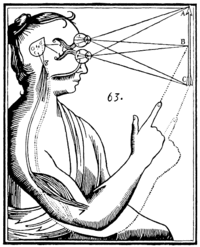- Mind–body problem
-
 René Descartes' illustration of mind/body dualism. Inputs are passed on by the sensory organs to the epiphysis in the brain and from there to the immaterial spirit.
René Descartes' illustration of mind/body dualism. Inputs are passed on by the sensory organs to the epiphysis in the brain and from there to the immaterial spirit.
The mind-body problem is a philosophical problem arising in the fields of metaphysics and philosophy of mind. The problem arises because mental phenomena appear to be qualitatively and substantially different from the physical bodies on which they appear to depend. There are a few major theories on the resolution of the problem. Dualism is the theory that mind and body are two distinct substances, and monism is the theory that mind and body are, in reality, just one substance. Monist materialists (also called physicalists) take the view that they are both matter, and monist idealists take the view that they are both in the mind. Neutral monists take the view that both are reducible to a third, neutral substance.
The problem was identified by René Descartes' in the sense known by the modern Western world, although the issue was also addressed by pre-Aristotelian philosophers[1] and in Avicennian philosophy.[2]
A dualist view of reality may lead one to consider the corporeal as little valued[1] and trivial. The rejection of the mind-body dichotomy is found in French Structuralism, and is a position that generally characterized post-war French philosophy.[3] The absence of an empirically identifiable meeting point between the non-physical mind and its physical extension has proven problematic to dualism and many modern philosophers of mind maintain that the mind is not something separate from the body.[4] These approaches have been particularly influential in the sciences, particularly in the fields of sociobiology, computer science, evolutionary psychology and the various neurosciences.[5][6][7][8]
Contents
Plato
Plato argued that, as the body is from the material world, the soul is from the world of ideas and is thus immortal. He believed the soul was temporarily united with the body and would only be separated at death, when it would return to the world of Forms. Since the soul does not exist in time and space, as the body does, it can access universal truths.
For Plato, ideas (or Forms) are the true reality, and are experienced by the soul. The body is for Plato empty in that it can not access the abstract reality of the world; it can only experience shadows. This is determined by Plato's essentially rationalistic epistemology.
See also
- General
- Bodymind
- Chinese room
- Consciousness
- Descartes' Error
- Dualism (philosophy of mind)
- Embodied cognition
- Explanatory gap
- Hard problem of consciousness
- Mind
- Namarupa (Buddhist concept)
- Philosophical zombie
- Philosophy of artificial intelligence
- Philosophy of Mind
- Problem of other minds
- Quantum mind–body problem
- Sacred-profane dichotomy
- Sentience
- Strange loop (self-reflective thoughts)
- The Mind's I (book on the subject)
- Turing test
- People
Notes and citations
- ^ a b The mind-body problem by Robert M. Young
- ^ edited by Henrik Lagerlund. (2007-09-30), Forming the Mind: Essays on the Internal Senses and the Mind/Body Problem from Avicenna to the Medical Enlightenment, Springer Science+Business Media, ISBN 9781402060830
- ^ Turner 96, p.76
- ^ Kim, J. (1995). Honderich, Ted. ed. Problems in the Philosophy of Mind. Oxford Companion to Philosophy. Oxford: Oxford University Press.
- ^ Pinel, J. Psychobiology, (1990) Prentice Hall, Inc. ISBN 8815071741
- ^ LeDoux, J. (2002) The Synaptic Self: How Our Brains Become Who We Are, New York:Viking Penguin. ISBN 8870787958
- ^ Russell, S. and Norvig, P. Artificial Intelligence: A Modern Approach, New Jersey:Prentice Hall. ISBN 0131038052
- ^ Dawkins, R. The Selfish Gene (1976) Oxford:Oxford University Press. ISBN
Kim, J., "Mind-Body Problem", Oxford Companion to Philosophy. Ted Honderich (ed.). Oxford:Oxford University Press. 1995.
Bibliography
- Turner, Bryan S. Body and Society: Exploration in social theory 1996
External links
- Wikibooks: Consciousness Studies
- The mind-body problem by Robert M. Young
Categories:- Arguments in philosophy of mind
- Dichotomies
- Dualism
- Philosophical problems
Wikimedia Foundation. 2010.

